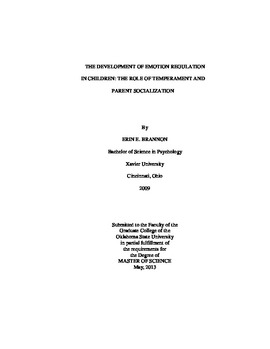| dc.description.abstract | Regulating emotions involves necessary and important skills that children must master to negotiate their day-to-day lives. A wealth of research has supported the negative effects of poor emotion regulation (ER) strategies, such as anxiety and depression, internalizing and externalizing behaviors, and poor social competence. A number of factors have been implicated in the development of ER in children including parents' socialization of emotions, parental expressivity, and children's temperament. Previous research suggests that children develop ER strategies through modeling parents' expressive behavior, verbal instruction, and symbolic learning. There is a paucity of research that has examined these factors simultaneously in a childhood sample. Therefore, the current study examined the association between parents' emotion regulation, parents' socialization of emotions, and children's temperament with children's emotion regulation strategies. The sample of 57 parent-child dyads (Child Mage = 7.2, Parent Mage = 36.8) completed a battery of questionnaires including the Emotion Regulation Checklist, the Emotion Regulation Questionnaire, Coping with Children's Negative Emotions Scale, and the Dimensions of Temperament Survey-Revised. The results showed an association between parents' ER and children's ER particularly with parent's use of reappraisal and children's adaptive emotion regulation. Temperament traits of approach/withdrawal, persistence, flexibility-rigidity, and mood quality were associated with both adaptive emotion regulation and lability/negativity. Parent's use of nonsupportive responses was also linked with children's ER. Regression analyses showed children's temperament traits of flexibility-rigidity, persistence, and parents' nonsupportive responses predicted children's use of adaptive emotion regulation. Whereas, children's temperament trait of mood quality and parents' nonsupportive responses predicted lability/negativity. This is the first study to examine these factors simultaneously to understand the combined and relative contributions of temporal factors on ER strategies. Our results emphasize the overall complexity of ER development particularly at an age when children are expected to have developed these skills. Our findings indicate that supportive parenting alone is not sufficient to promote children's ER strategies, but that unsupportive parenting is important to the development of ER strategies. Future studies should examine factors such as verbal reasoning and comprehension, as well as utilize a longitudinal design to identify the age at which children develop these strategies. | |
